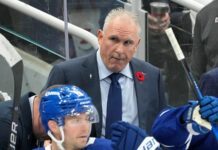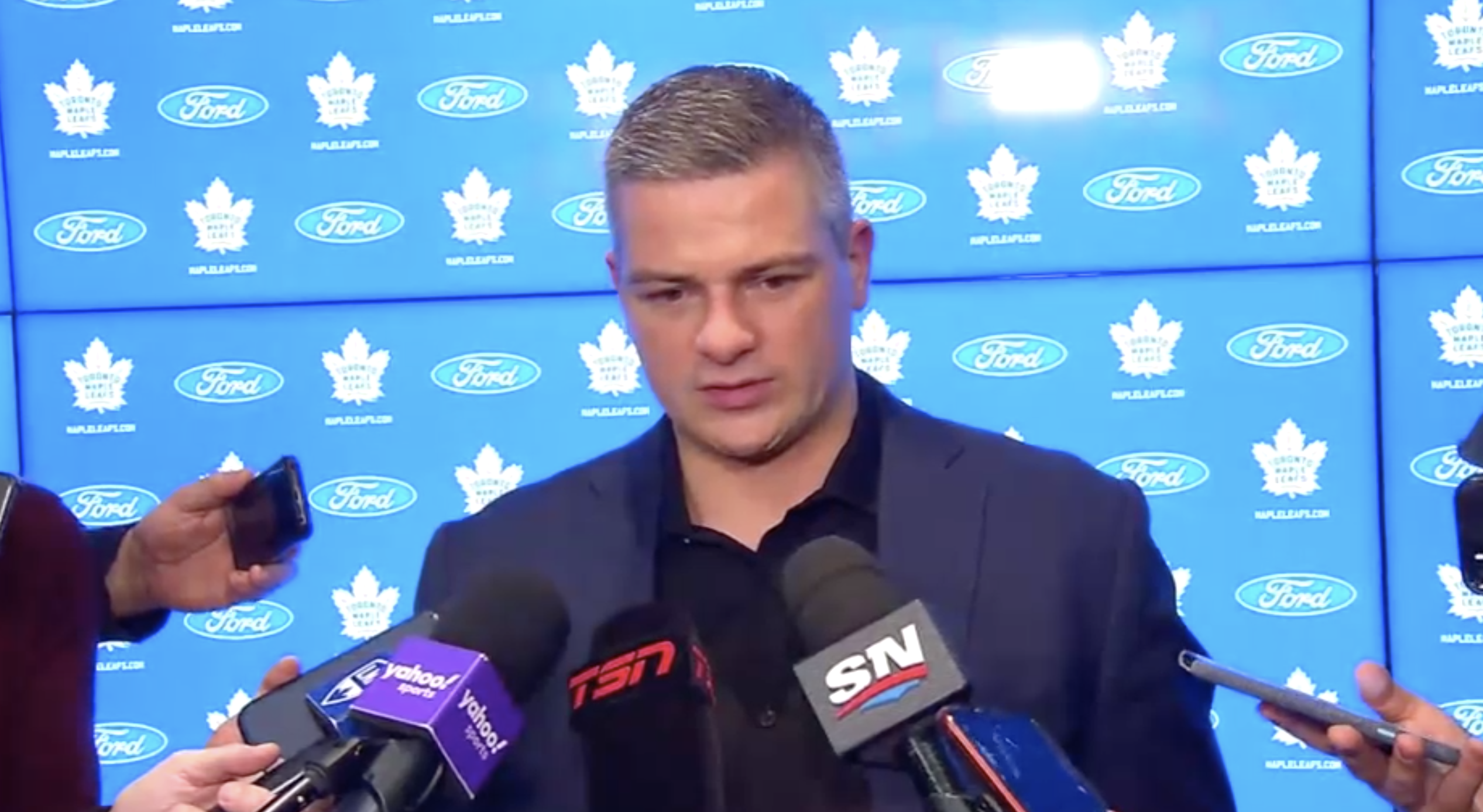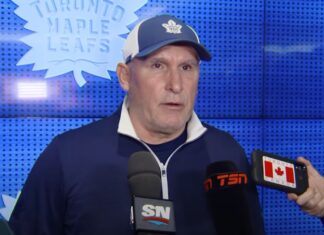Sheldon Keefe addressed the media after practice on Tuesday, discussing his coaching style, developing relationships with the players, learning from other coaches in other sports, the decision to recall Michael Hutchinson, and more.
At the end of practice, you had an animated discussion with William Nylander. How important are relationships that go back five seasons, with his introduction to North American pro hockey and your relationship in that regard?
Keefe: I am fortunate that I do have some time spent with a good number of the players here, but just to rely on that would not be very good for me. I’ve got to re-establish those relationships and a lot has changed in that time. The players have learned and matured. Obviously, their lot in life is different than when they were playing for the Marlies. I’ve got to re-establish those things and that is what I am trying to do here one day at a time and one player at a time. As time allows, I try to touch base with everybody.
How much have you been able to accomplish over these two days of practice?
Keefe: I feel like we’ve been able to accomplish the things that we wanted to. We were trying to keep things in perspective — to not try to do too much still. Even though we had two days, you still can’t have the players on the ice for too long. You’re still in the meat of an NHL season, so you’ve got to be mindful of the players’ energy levels and what they’re accustomed to in terms of the time on the ice. Our meetings have been a little bit longer and we’ve covered more than we normally would like to. We’d like a little bit more of the players in that sense. Yesterday’s practice was a little bit longer than normal. We are asking a little bit more, but we are happy with what we have done. We’ve tried not to fix everything all at once.
Why did the organization try to make the change at backup goalie and give Hutchinson another chance?
Keefe: I think it was a matter of the fact that Hutch had gone down to the Marlies and had played very well down there. And the fact that he has played. He’s played three games and two on the weekend, so he’s gotten those reps. Obviously, we are going to be in a situation where we are going to use the backup goalie this week. We just figured it wasn’t necessarily one versus the other. With the fact that Hutch has played and is sharp and, of course, has the experience here, we wanted to give him another chance.
Are you going to play him in the first game?
Keefe: Right now I’m focused on Wednesday’s game in Detroit. We will make our decisions after that.
You were also talking to Timashov a little bit. How important is it keep guys on the fringes also in the middle of what is going on?
Keefe: That is really important. In Tima’s case, he hasn’t played in a little while here. We just wanted to connect just to give him a sense of what I was looking for from him but also, he didn’t play last week, and with a lot of the changes, we wanted to make sure he was up to speed and was comfortable with what has been going on.
How did you arrive at your coaching style? Is it a number of influences that shaped you, or was it your playing experience?
Keefe: I think it’s a little bit of everything. Year over year, I’ve tried to read and learn from other coaches and other sports and other avenues — not just sports but business and education and all of those type of things — that can help you sort out how to interact with players and how to create an environment and how to teach. I’ve tried to dedicate a lot of time to trying to get better every year and I’ve been fortunate to have a lot of great resources around here with the Marlies to help me do that.
Kyle Dubas looks at a lot of other sports in terms of how to improve his job. What other coaches and managers in other sports have you looked to and try to learn from?
Keefe: The ones that stand out to me are the guys like Popovich out in San Antonio and Joe Madden in the MLB. Those are the guys that stand out for me, but then a number of coaches in the NFL — Sean McVay, Pete Caroll. Those types of guys I spend a lot of time reading about and trying to learn from. Of course, right here with Nick Nurse and the job he has done with the Raptors; to be able to watch that as a guy coming in as a first-time head coach and trying to learn from that experience as well. I don’t think I’ve tried to hone in too closely on anybody, but if there is something out there I can read or learn from, I try to do that.
The story of Mitch Marner and Mike Babcock and how he tried to motivate him in his rookie year has created a lot of conversation here. How has the way coaches try to motivate players changed even from when you were a player to now?
Keefe: I think there has been a lot of change in that regard. For myself, I try to deal more directly and more in a positive nature as much as possible. I think players respond well to that if you try to be constructive. Every situation is different. Every situation calls for something different. I don’t know if there is any one style. Any time you can adapt to whatever that player or that situation calls for is what I am looking to do.
There has been quite a bit of one-on-one conversation between you and the players in practice. Is that because you are trying to get to know the guys, or is it something you want to see going forward?
Keefe: A little bit of both. I think it is important. On the ice, it’s a good chance to check in with some guy. Once they get here in the building, things are moving pretty quickly and you are bouncing around and trying to do your own things. On the ice, it is easier to grab them. I try to do that, but obviously, at this point in time, it’s all the more important that I make my rounds.
What are you going to be looking for tomorrow night that would indicate the last two days in practice have been highly productive?
Keefe: We are looking to really firm up some details in our defensive-zone coverage and looking to protect our net better than we have and also have a lot more pressure on the puck in different spots. That is going to be important for us.
And then just being more comfortable with at times, moving the puck quickly and getting through the neutral zone fast, and the times we want to maybe use our skills and build some speed. It’s just kind of making those decisions and being on the same page a little bit better.















![John Gruden after the Leafs prospects’ 4-1 win over Montreal: “[Vyacheslav Peksa] looked really comfortable in the net… We wouldn’t have won without him” John Gruden, head coach of the Toronto Marlies](https://mapleleafshotstove.com/wp-content/uploads/2025/09/gruden-post-game-sep-14-218x150.jpg)


















